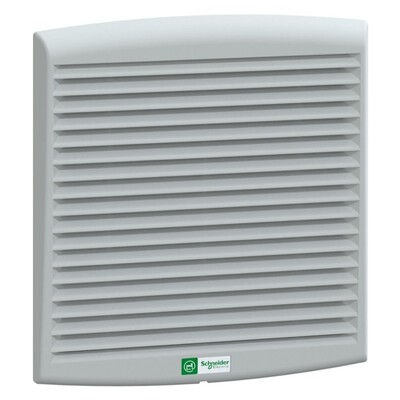For electrical engineers and distributors, ensuring the longevity and optimal performance of electrical components is paramount. This is particularly crucial within enclosures, where heat build-up can pose a significant threat. Here's where filter fans step in as a simple yet critical solution for thermal management.
Electrical components naturally generate heat during operation. Within the confined space of an enclosure, this heat can become trapped, leading to a rise in internal temperature. Excessive heat can have a multitude of detrimental effects. It can accelerate the degradation of electrical components, shortening their lifespan and increasing maintenance costs. Heat can also cause components to malfunction or operate erratically, leading to system instability and potential equipment failure. In the worst-case scenario, overheated enclosures pose a fire risk and can damage surrounding equipment or buildings.
Filter fans offer a cost-effective and efficient solution for mitigating heat build-up in enclosures. They combine two essential functions: airflow and filtration. The fan component draws in cool air from the external environment and circulates it throughout the enclosure. This process helps to dissipate heat generated by internal components, The filter component prevents dust, dirt, and other airborne contaminants from entering the enclosure. These contaminants can act as insulators, trapping heat around sensitive components.
With various filter fan options available, selecting the right unit for your specific application requires careful consideration of several factors. The airflow capacity of the filter fan should be sufficient to handle the heat generated within the enclosure. You should also consider the total wattage of the equipment housed inside.
Different fan types offer varying capabilities. Axial fans offer high airflow at lower pressures, making them suitable for general ventilation. Filter fans offer additional advantages. By preventing dust build-up on internal components, filter fans can minimise the need for frequent cleaning and maintenance. Consistent cooling helps to ensure optimal performance and reduce the risk of component failure. Ultimately, by mitigating the detrimental effects of heat, filter fans can significantly extend the lifespan of electrical equipment.
Filter fans represent a reliable and cost-effective solution for ensuring optimal thermal management within enclosures. By understanding the threats posed by heat build-up and selecting the appropriate filter fan for your application, you can safeguard your electrical components, promote system reliability, and extend equipment life.
When selecting a filter fan, keep these additional factors in mind: noise levels, power consumption, and replacement filters. Consider the noise output of the filter fan, especially if it will be installed in a noise-sensitive environment. Evaluate the power consumption of the filter fan to ensure it aligns with your overall power budget. Finally, factor in the availability and cost of replacement filters for the chosen filter fan model.
By keeping these considerations in mind, you can select the ideal filter fan solution to keep your electrical components cool and operating at peak performance.
